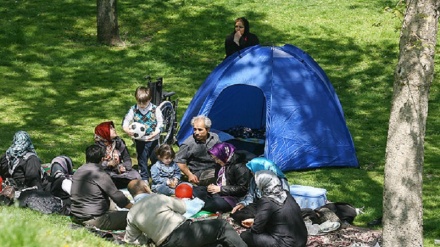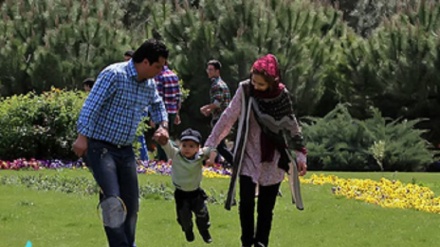Iranian family (12)
Welcome to this week's episode of the series "Iranian Family". Feelings and emotions have the first say in the family. Humane and ethical values are always warmly welcomed by families. The fact of the matter is that love is one of the main pillars of families and plays a unique role in the survival and establishment of balance among other foundations of families.
Today, we become familiar with some of the customs and traditions of familiarization of would-be spouses with each other, prior to their marriage.
It was said that in Iranian families, this experience takes shape in the engagement period. After the completion of the proposal ceremonies, and presentation of the wedding ring by the groom's family to the bride, the groom's family have in fact received the positive response from the bride's family. In some families, the period of engagement starts there and then. These families provide a longer period of time for the would-be spouses to further interact with each other and to be more familiarized with each other's manners, so that if the would-be spouses would thereafter be still keen to marry each other, they would inform their families to make the necessary arrangements for wedding ceremonies.
Generally speaking, the engagement period is one of the sweetest phases in the life of any Iranian girl and boy. This phase marks the beginning of a new life, in which the would-be spouses make utmost efforts to better know each other and decide whether they intend to live together for the rest of their lives.
Meanwhile, in accordance with Iran's rules and regulations, engagement can be annulled by each of the two would-be spouses. However, if an engaged individual annuls engagement for no justified reason, the other individual can demand the conventional expenses which he/she has afforded for marriage, from the former. Moreover, if an engagement is annulled, each of the would-be spouses and their parents are entitled to taking back the gifts they have presented to each other within the engagement period.
In Iranian families, the engagement period is based on the related parties' agreement. The engagement ceremony can be held as a small familial gathering in the presence of close families, or in the form of a glorious gathering, in the presence of a large number of guests.
In Iran, after the engagement ceremony, the two families further interact with each other so that they would be further familiarized with each other and the would-be spouses would get to know each other's characteristic traits, as much as possible.
In the Iranian culture, usually in this period of time, the groom's family expect the bride to fully embark on their son's life. However, some of the families of brides believe the groom is considered as a stranger until the would- be spouses' marriage and wedding, thereby imposing a number of restrictions on the would-be spouses. For instance, the meetings of the would-be spouses may only be held in the presence of families.
One of the opportunities which arises in the engagement period is that the would-be spouses become familiar with the realities of life, habits, and characteristic traits of their future spouse and his/her family. Meanwhile, the engagement ceremonies are coupled with especial customs and traditions in each of the cities of Iran.
In Sistan-Baluchestan region, marriages usually took place based on familial and tribal bonds. However, in the recent years, youths personally make decisions about their fate. In the engagement period, usually the bride's father invites the groom in one of Eids, and after the meeting, the groom usually presents a gift, in addition to a sheep to bride's family. The engagement period at times takes up to two years. After the groom becomes capable of affording the wedding expenses, he prepares and presents a number of gifts to the bride and her family. Then, the groom ponders about provision of food for hosting the related guests, and upon preparation of the needed items, women carry the related food items on their heads, heading toward the bride's house, while musical instruments such as kettledrums are played. After the wedding ceremony, the groom and the bride are left on their own. In Baluchestan, the groom is taken to bride's house. Nearly a month after the wedding ceremony, the bride and the groom settle in groom's house, and their married life begins.
In the city of Elam, after the completion of the proposal ceremonies, and acceptance of gifts; in a particular day, the women of both families gather in the house of the bride's father; with the groom's family presenting a headscarf, a ring, a number of clothing, some confectioneries, sugar cubes, cooking oils, and bags of rice to bride's family. As of that day until the wedding ceremony, the groom is duty-bound to serve and assist bride's parents in the farmland, in harvesting the related crops, and whenever guests arrive in the bride's parental house. Also, all of the life expenses of the bride are afforded by the groom's family.
MR/ME


